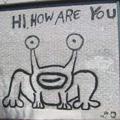Jim Brown reviewed We Are the Union by Eric Blanc
Worker-to-worker organizing in a decentralized world
This book, by my Rutgers colleague Eric Blanc, takes up some of the difficulties of labor organizing in the contemporary social and political climate. He argues for a worker-to-worker model of organizing, which relies on training workers to organize one another rather than hiring large numbers of staff to establish unions and organize workers. A staff-heavy model is expensive and doesn't scale, and a worker-to-worker model is not only more efficient but also (obviously) draws on workers' direct experience.
To me, the most interesting part of the argument is about "decentralization." Workers are mostly, unlike in the 1930s, not gathered in large numbers in hubs of labor (factories, etc.). How do we organize workers when there's no central "shop floor" let alone social clubs or other spaces where everyone gathers on a regular basis? More than this, I'd argue that workers aren't necessarily "decentralized" in many industries. Instead, they …
This book, by my Rutgers colleague Eric Blanc, takes up some of the difficulties of labor organizing in the contemporary social and political climate. He argues for a worker-to-worker model of organizing, which relies on training workers to organize one another rather than hiring large numbers of staff to establish unions and organize workers. A staff-heavy model is expensive and doesn't scale, and a worker-to-worker model is not only more efficient but also (obviously) draws on workers' direct experience.
To me, the most interesting part of the argument is about "decentralization." Workers are mostly, unlike in the 1930s, not gathered in large numbers in hubs of labor (factories, etc.). How do we organize workers when there's no central "shop floor" let alone social clubs or other spaces where everyone gathers on a regular basis? More than this, I'd argue that workers aren't necessarily "decentralized" in many industries. Instead, they are dispersed, especially those who are working from home. This is a massive challenge for contemporary organizing, and Blanc offers the worker-to-worker model as a way to try to answer it.
He also is pretty optimistic about "digital tools" in this book. I am not. I see how zoom trainings can get people started with organizing even if an organization can't afford to send an organizer for face-to-face training. And maybe Instagram gets the word out about a union election and/or campaign. But more than anything, digital technologies seem to be mostly exacerbating the problems of dispersal, alienation, and isolation. When it comes down to it, f2f organizing is the key, and it's really difficult to do that when everyone is in different places and different times. Blanc knows this, and this is why he turns to the digital. He also recognizing that digital tools can't replace tried-and-true methods of organizing. But I am just more skeptical than him that we should rely on those tools much at all given that they are contributing to the problems we're trying to address.

